An incredible semester in one of the most beautiful places on Earth Past Review
By Will Greene (Middlebury College) - abroad from 09/15/2017 to 12/08/2017 with
Round River Conservation Studies - Patagonia, Chile Program
I think my biggest take-away from the program was getting real field experience in conservation biology- the discipline that I'm majoring in. We spent more than a month in the field in remote parts of Patagonia collecting data, which was challenging, fun, and exciting. I'll also take away an appreciation for the local Gaucho culture, alongside an understanding of the complexities of balancing conservation and livelihoods/culture of the people who live there. Lastly, I'll take away some incredible relationships that I built with the instructors and the other students - it was a remarkable group of people that I'm lucky to have been a part of.
Review Photos
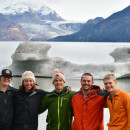
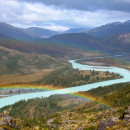
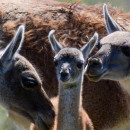
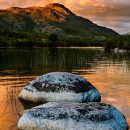
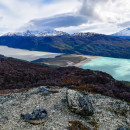
Personal Information
| How much international exposure did you have prior to this program? | 2 weeks - 1 month |
Review Your Program
|
* Overall educational experience
Academic rigor, intensity, resources, etc. |
Round River Conservation Studies in Chilean Patagonia is a fantastic program to say the least. It provides invaluable field experience in an incredibly remote and beautiful part of the world, while exposing students to a new culture, environment, and language in a friendly, non-stressful way. The academics weren't incredibly rigorous, but that gave me a welcome opportunity to learn for the sake of learning, focus on research, and experience the place in a way that would have been impossible had the academic courses been as rigorous as in a normal semester in college. It was the adventure of a lifetime, with a fantastic group and great instructors, and I came away with an in-depth natural history knowledge of Patagonia, and an understanding of the complexity and importance of conservation in the real world. |
|
* Host Country Program Administration
On-site administration of your program |
Everything was extremely laid back in terms of the program's operation, which allowed us the flexibility we needed to be able to function smoothly in a highly variable environment, but at times things felt a bit disorganized as a result. |
|
* Housing:
How satisfied were you with your living arrangements? |
I lived in my own tent for 3 months, which was what I went into it expecting, and loved every second of it. A bonus was that I got a nice bed all to myself on our 5-day homestay! |
| * Food: |
The food was primarily backpacking food, which I expected. Lots of simple carbohydrates and not much in terms of fruit in vegetables. It's clearly not RRCS's fault - food availability in Patagonia is a bit slim. |
|
* Social & Cultural Integration:
How integrated did you feel with the local culture? |
Since the program did not require spanish skills, interaction with locals was pretty much entirely self-motivated. Still, opportunities were plentiful and I felt like I built some great relationships with some of the local people we worked with. RRCS definitely provides the opportunities to feel integrated, but doesn't force them on students. |
|
* Health Care:
How well were health issues addressed during the program? |
Professional healthcare options are typically at least an 8-hr drive away on a dirt road, but the instructors were completely willing to make this happen if the necessity arose (it didn't). The instructors are all WFR certified at least and were very competent at dealing with the minor injuries sustained by group members. |
| * Safety: |
It doesn't get much safer than Cochrane, Chile. The town only has 3,500 residents and we all felt very safe despite our lack of fluency in the language. I left most of my valuables simply zipped in a tent, as did all of us. |
| If you could do it all over again would you choose the same program? |
Yes
This program was incredible; I would do it again in a heartbeat. Our instructors were fantastic and felt more like friends than professors, the academic setting was extremely low-stress, and the 7 other students on the program were some of the best people I've ever met. |
Finances
|
* Money: How easily were you able to live on a student's budget?
(1 = not very easy/$200+ on food & personal expenses/week, 2.5 = $100/week, 5 = very easily/minimal cost) |
The program did not require students to spend any money, everything was covered. |
| Not including program expenses, about how much money did you spend on food and other expenses each week? | $10 |
| Do you have any general money-saving tips for future study abroad participants? | The only things you would ever spend money on are alcohol and empanadas in town. At the beginning and end of the trip, souvenirs can be bought in Coyhaique, but that's completely up to you. It would be entirely possible to spend $0 the entire semester. |
Language
| * Did your program have a foreign language component? | Yes |
|
How much did the program encourage you to use the language?
0 = No encouragement, 5 = frequent encouragement to use the language |
Many of us had little to no Spanish skills going into the program, so its use was not required, however instructors encouraged us to use it whenever we could. There was also a home-stay component where Spanish skills were necessary to communicate. |
| How would you rate your language skills at the beginning of the program? | Beginner |
| How would you rate your language skills at the end of the program? | Intermediate |
| What was the highest level language course you had completed prior to departure? | Spanish 3 in high school |
| How many hours per day did you use the language? | |
| Do you have any tips/advice on the best ways to practice the language for future study abroad participants? | Practice the language beforehand if you can, but it isn't totally necessary - just come ready to be pushed out of your comfort zone. |
Other Program Information
|
* Where did you live?
Select all that apply |
|
|
* Who did you live with?
Select all that apply |
|
|
* Who did you take classes with?
Select all that apply |
|
| About how many local friends did you make that you will likely keep in touch with? |
A Look Back
| * What did you like most about the program? |
|
| * What could be improved? |
|
| * What do you know now that you wish you knew before going on this program? | I think I would've liked it to be more clear that fully half of the time in the program would be spent at basecamp; I think I expected more time in the field than we got, which ended up being a good thing. |
Reasons For Studying Abroad
| To help future students find programs attended by like-minded individuals, please choose the profile that most closely represents you. |
The Avid AdventurerThe wardrobe you packed was better suited for a semester of camping than club hopping. Outdoorsy, you might forgo a crazy night out for an early all-day adventure. You'd rather take in the rich culture of an old town than the metropolis of a modern city, but for you getting off the grid is ideal. |
Individual Course Reviews
| Course Name/Rating: |
Humans and the Environment |
| Course Department: | |
| Instructor: | RRCS staff (Adam Spencer, Shalynn Pack, Scott Braddock, Eli Brunner, Valeria Briones) |
| Instruction Language: | English |
| Comments: | This was a great discussion-based course that was primarily readings, student-led discussions, and lectures. Assessment came in the form of handwritten essays essentially reflecting on our readings and experiences in the field. Instructors didn't claim to be total experts in the field, and were great discussion facilitators, allowing us to learn from each other as much as from the readings or lectures. |
| Credit Transfer Issues: | Haven't transferred credit yet but other students have had no issues in the past. |
| Course Name/Rating: |
Applied Restoration Ecology |
| Course Department: | |
| Instructor: | RRCS staff (Adam Spencer, Shalynn Pack, Scott Braddock, Eli Brunner, Valeria Briones) |
| Instruction Language: | |
| Comments: | As with all the other RRCS courses, it wasn't particularly challenging, but offered plenty of opportunity for learning in a low-stress environment from readings, discussions, and lectures. Instructors were great, and were able to share their first-hand experience in the field with us. Assessments were exam-based and required us to apply our learning to develop restoration plans for the areas we worked in. |
| Credit Transfer Issues: | Have not transferred credit yet |
| Course Name/Rating: |
Natural History of Patagonia |
| Course Department: | |
| Instructor: | RRCS staff (Adam Spencer, Shalynn Pack, Scott Braddock, Eli Brunner, Valeria Briones) |
| Instruction Language: | English |
| Comments: | This was by far my favorite course of the semester. We got to spend hours and hours in the field learning how to identify plants and animals (especially birds) by their English, Spanish, and Latin names. Natural history is my favorite academic subject by far, the this course did not disappoint; all the instructors were very knowledgable, and were talented at passing along that knowledge. It also felt especially useful because we used most of the knowledge we gained almost immediately in the field, carrying out research. Assessments took the form of ID quizzes in the field, as well as Grinnell Journal entries documenting natural history observations and hypotheses over the course of several days. |
| Credit Transfer Issues: | N/A |
| Course Name/Rating: |
Biological Field Methods |
| Course Department: | |
| Instructor: | Round River Staff (Adam Spencer, Shalynn Pack, Eli Brunner, Scott Braddock, and Valeria Briones) |
| Instruction Language: | English |
| Comments: | This course was about learning how to carry out field research, and wasn't assessed so much as used in our actual research. The lectures acted as briefing sessions, after which we were expected to use those skills to collect data. Along with natural history, this was the most practical class, and was hands-on in its approach. Since the field research is the primary component of the instructor's jobs, they were all very knowledgable and helpful in the field when we had questions. |
| Credit Transfer Issues: | N/A |
| Course Name/Rating: |
Applied Conservation Biology |
| Course Department: | |
| Instructor: | Round River Staff (Adam Spencer, Shalynn Pack, Eli Brunner, Scott Braddock, and Valeria Briones) |
| Instruction Language: | English |
| Comments: | Of all the courses, this was the most typical college class; we had readings, often from scientific journals, lectures by our instructors, and class discussions where we debated the different aspects of Con Bio. I thought it was the most challenging and extensive in terms of material load of our courses, but it was also extremely interesting and closely tied to the work we were doing in the field. Adam Spencer taught most of the classes and was a very effective teacher. I think most of the students were required to put the most effort into this class, and we all participated well. Assessment was in exam format as well as written essays and in-class quizzes. |
| Credit Transfer Issues: | N/A |








